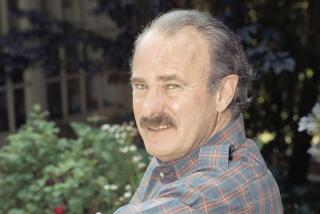JAZZ REVIEW : Coleman Mixes Free-Form, Funk Styles
- Share via
Clint Eastwood’s new movie “Bird” features solos from many of Charlie Parker’s original recordings, upgraded to contemporary sound via the electronic addition of a new rhythm section.
Curiously, Ornette Coleman’s program at the Palace on Monday night had a similarly anachronistic feeling, with its juxtaposing of the saxophonist’s 30-year-old free jazz improvisational style against the funk-driven, highly compartmentalized energies of a double rhythm section.
The current edition of Coleman’s Prime Time, a group which he appears to perceive as a more commercially viable vehicle for his music than his more familiar quartet, featured two bassists (Chris Walker and Al MacDowell), two guitarists (Ken Wessell and Chris Rosenberg), tabla player Badal Roy and drummer Denardo Coleman. In their better moments, they produced a roiling mass of sound and rhythms comparable to that of Coleman’s famous double quartet of the early ‘60s.
More often, however, the music (none of it identified, but most coming from his new “Virgin Beauty” album) tended to fall into the even meters and repetitive phrases of contemporary funk, effectively clipping the wings of Coleman’s attempts to fly. And that was unfortunate, because his improvisations, still rich with the disingenuous charm of a performer who hears only his own muse, were as appealing as ever.
The effectiveness of Prime Time’s performance was further hampered by the Palace’s atrocious acoustic environment. Roy, one of the finest tabla players in the world, was heard to advantage only in a brief opening solo, with the balance of his playing visible by sight, but almost never by sound. Even more problematic, the use of a rock-style audio mix lost most of the rich coloration of Coleman’s alto saxophone sound, virtually burying it in the overamplification of basses and drums.
It was a tribute to Coleman that his music--like Parker’s--managed to survive, despite the external conditions. Regardless of whether Prime Time achieves his commercial goals, Coleman’s playing Monday night made it clear that his role as one of jazz’s most significant mavericks remains fixed and firm.
More to Read
The biggest entertainment stories
Get our big stories about Hollywood, film, television, music, arts, culture and more right in your inbox as soon as they publish.
You may occasionally receive promotional content from the Los Angeles Times.










